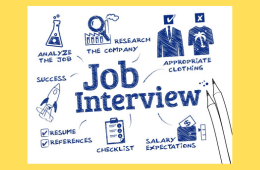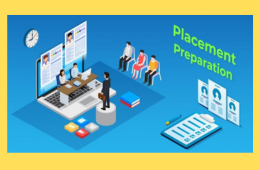Campus placement interviews are an essential part of the job search process for students. They are designed to assess a student’s knowledge, skills, and abilities to determine whether they are a good fit for the organization. It’s important for students to prepare well for these interviews to increase their chances of landing their dream job.
Understanding the Interview Process is the first step to a successful campus placement interview. Students should research the company and the position they are applying for, and prepare answers to common interview questions. They should also practice their interview skills with friends or family members to gain confidence and prepare for unexpected questions.
Preparation Strategies are crucial for a successful campus placement interview. Students should dress professionally, arrive early, and bring extra copies of their resume. They should also prepare a list of questions to ask the interviewer to demonstrate their interest in the company and the position.
Key Takeaways
- Understanding the Interview Process is crucial for success.
- Preparation Strategies can make or break your interview.
- Creating a Positive Impression and Effective Communication Skills are equally important.
Understanding the Interview Process
Campus placement interviews are designed to assess a candidate’s suitability for a particular role. The process typically consists of several stages, including pre-screening, technical interviews, behavioral interviews, and HR interviews.
Types of Interviews
Pre-Screening Interviews
Pre-screening interviews are usually conducted over the phone or via video conferencing, and are designed to shortlist candidates for further interviews. During pre-screening interviews, recruiters typically ask candidates about their educational background, work experience, and skills to determine whether they meet the basic qualifications for the role.
Technical Interviews
Technical interviews are designed to assess a candidate’s technical skills and knowledge. During these interviews, candidates may be asked to solve coding problems, answer technical questions, or complete a technical task. Technical interviews are typically conducted by a technical expert or a team of technical experts.
Behavioral Interviews
Behavioral interviews are designed to assess a candidate’s soft skills, such as communication, teamwork, problem-solving, and leadership. During these interviews, candidates may be asked to provide examples of how they have handled specific situations in the past. Behavioral interviews are typically conducted by a hiring manager or HR representative.
What Interviewers Look For
During the interview process, interviewers are typically looking for candidates who have the right combination of technical skills, soft skills, and cultural fit. Technical skills are important because they demonstrate a candidate’s ability to perform the job. Soft skills are important because they demonstrate a candidate’s ability to work well with others and contribute to the team. Cultural fit is important because it ensures that the candidate will be able to adapt to the company’s culture and values.
In addition to technical skills, soft skills, and cultural fit, interviewers may also be looking for candidates who are passionate about the job, have a positive attitude, and are willing to learn and grow. Candidates who demonstrate these qualities are more likely to be successful in the role and to make a positive impact on the company.

Preparation Strategies
Preparing for a campus placement interview can be a daunting task, but with the right strategies in place, candidates can increase their chances of success. Here are some effective preparation strategies that can help candidates ace their campus placement interviews.
Researching the Company
Before attending any campus placement interview, candidates should research the company they are interviewing with. This includes understanding the company’s mission, values, products, services, and culture. Candidates can use this information to tailor their answers to the specific needs of the company and demonstrate their interest in the position they are applying for. They can also use this information to ask relevant questions during the interview and show their enthusiasm for the company.
Mock Interviews
Conducting mock interviews is an excellent way for candidates to prepare for campus placement interviews. Mock interviews can help candidates identify their strengths and weaknesses and improve their interviewing skills. Candidates can ask a friend, family member, or career counselor to conduct the mock interview and provide feedback on their performance. They can also record themselves during the mock interview and review it later to identify areas for improvement.
Reviewing Common Questions
Candidates should review common interview questions and prepare answers in advance. This includes questions about their strengths, weaknesses, career goals, and work experience. They should also prepare for behavioral questions that require them to provide specific examples of how they have handled challenging situations in the past. Reviewing common questions can help candidates feel more confident and prepared during the interview.
In conclusion, preparing for a campus placement interview requires research, practice, and preparation. Candidates who take the time to research the company, conduct mock interviews, and review common questions are more likely to succeed in their interviews.

Creating a Positive Impression
When it comes to campus placement interviews, creating a positive impression is key. Students who make a good first impression are more likely to be remembered by interviewers and have a better chance of landing the job. Here are a few tips for creating a positive impression during a campus placement interview.
Dress Code
Dressing appropriately is an important part of creating a positive impression. Students should dress professionally for the interview, which means wearing clean, pressed clothes that fit well. For men, this typically means a suit and tie, while women should wear a suit or a blouse and skirt. It’s important to avoid wearing anything too flashy or revealing, as this can be distracting and take away from the focus of the interview.
Body Language
Body language is another important aspect of creating a positive impression. Students should maintain good posture throughout the interview and avoid slouching or fidgeting. They should also make eye contact with the interviewer and smile when appropriate. It’s important to avoid crossing one’s arms or legs, as this can come across as defensive or closed off.
Punctuality
Being punctual is crucial for creating a positive impression. Students should arrive at the interview location at least 10-15 minutes early to allow time for any unexpected delays. If running late, it’s important to call ahead and let the interviewer know. Being punctual shows that the student is responsible and takes the interview seriously.
Overall, creating a positive impression during a campus placement interview is crucial for landing the job. By dressing appropriately, maintaining good body language, and being punctual, students can make a memorable impression on the interviewer and increase their chances of success.
Effective Communication Skills
Effective communication skills are essential during campus placement interviews. Candidates should focus on listening actively, articulating responses clearly, and asking insightful questions.
Listening Actively
During an interview, active listening is crucial. It shows the interviewer that the candidate is engaged and interested in what they have to say. To listen actively, the candidate should maintain eye contact, avoid interrupting the interviewer, and take notes if necessary.
Articulating Responses
Articulating responses clearly is an important aspect of effective communication. The candidate should speak clearly and concisely, and avoid using filler words such as “um” and “like.” They should also provide specific examples to support their answers and avoid making exaggerated or false claims.
Asking Insightful Questions
Asking insightful questions demonstrates the candidate’s interest in the company and the position. The candidate should prepare a list of questions beforehand and ask them during the interview. The questions should be relevant and show that the candidate has done their research on the company.
Overall, effective communication skills are essential during campus placement interviews. Candidates should focus on listening actively, articulating responses clearly, and asking insightful questions to make a positive impression on the interviewer.
Post-Interview Etiquette
After the interview, there are a few things candidates can do to increase their chances of getting hired. Two important things to keep in mind are sending thank-you notes and following up.
Sending Thank-You Notes
Sending a thank-you note after the interview is a great way to show appreciation and interest in the position. It is also an opportunity to reiterate why the candidate is a good fit for the job. The note should be sent within 24 hours of the interview and can be either handwritten or emailed.
In the note, the candidate should thank the interviewer for taking the time to meet with them and express their continued interest in the position. They should also briefly summarize why they are a good fit for the job and mention any points that were discussed during the interview.

Following Up
Following up after the interview is a way to show continued interest in the position and to get feedback on the interview. The candidate should wait a week after the interview before following up, as the interviewer may still be in the process of interviewing other candidates.
When following up, the candidate should first thank the interviewer again for the opportunity to interview. They should then ask if there is any additional information they can provide or if there is a timeline for the hiring decision. If the candidate does not hear back after one follow-up, they can send one more email or make one more phone call, but should not be too persistent.
By following these post-interview etiquette tips, candidates can increase their chances of getting hired and leave a positive impression on the interviewer.
Frequently Asked Questions
How can one effectively introduce themselves in a campus placement interview?
The first impression is crucial in any interview, and a campus placement interview is no different. One should introduce themselves with confidence and clarity. It is essential to maintain eye contact, smile, and greet the interviewer. The introduction should include the candidate’s name, educational background, and relevant experience. One should also highlight their skills and strengths, which are relevant to the job profile.
What are the key strategies to crack a campus placement interview?
To crack a campus placement interview, one should prepare well in advance. It is essential to research the company and the job profile. One should also practice answering common interview questions and prepare for technical questions. Dressing appropriately, maintaining a positive attitude, and being confident are also crucial. It is also essential to have good communication skills and the ability to articulate ideas effectively.
Which common questions should students expect during a placement interview?
The questions asked during a campus placement interview can vary depending on the job profile and the company. However, some common questions that students can expect include questions about their strengths and weaknesses, their educational background, their experience, and their career goals. Technical questions related to the job profile may also be asked.
What are the best ways to prepare for technical questions in a campus placement?
To prepare for technical questions, one should thoroughly research the company and the job profile. It is also essential to brush up on technical skills related to the job profile. One should also practice solving technical problems and be prepared to explain their approach. It is also crucial to stay up to date with the latest developments in the field and be familiar with industry-specific tools and technologies.
How can students manage stress and present themselves confidently in a placement interview?
Managing stress is essential to present oneself confidently in a placement interview. One should practice relaxation techniques such as deep breathing, meditation, or visualization. It is also essential to get enough sleep, eat healthily, and exercise regularly. Adequate preparation and self-confidence can also help manage stress.
What are the essential non-technical skills evaluators look for in campus interviews?
Apart from technical skills, evaluators also look for essential non-technical skills such as communication skills, problem-solving skills, teamwork, and leadership skills. They also look for candidates who are adaptable, flexible, and have a positive attitude. It is also essential to have good time management skills and the ability to work under pressure.

